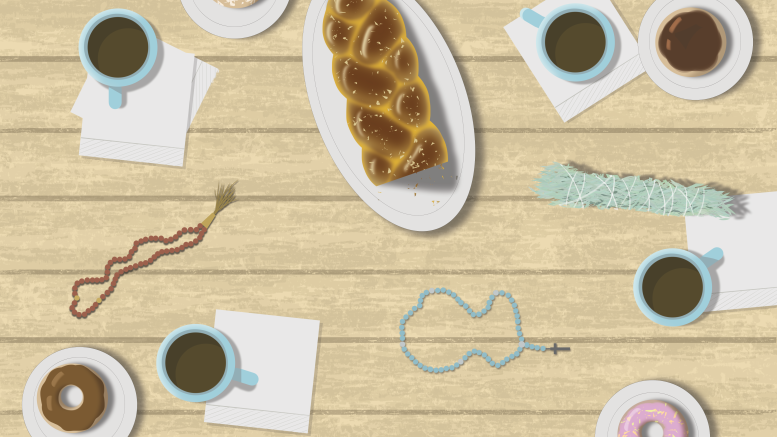The University of Manitoba is renovating its lounge and planning coffee and donut get-togethers for students as part of a larger plan of rejuvenating the community in the department.
Nicole Goulet, an instructor in the religion department who came to the U of M in 2021, is one of the faculty members leading the charge to make the lounge “a nice space for our majors and minors, basically, so they can create a community there.”
“It’s hard to build a community amongst our students when they’re scattered, doing different courses, maybe not talking to each other in class,” she said.
Head of the religion department and associate professor Kenneth MacKendrick said the religion department lounge, which has been previously considered a space primarily for graduate students, has the potential to be a place where all religion students can connect.
Coming out of the lockdown period during the COVID-19 pandemic, the faculty has been looking for ways to support and improve community spirit within the program and reach out to undergraduate students.
Part of those changes will include making sure undergraduate students have a space to get to know each other outside of classroom settings, MacKendrick said.
“We had tried a couple of events, but we were never really able to get a lot of things off the ground,” he said. “I think one of the shifts that COVID brought about was we became increasingly aware of the difficulties and challenges of undergraduate student life.
“As a research university, I think we have a long history of supporting graduate students and graduate student life,” MacKendrick said. However, he emphasized that role undergraduate students play on campus is “actually, for us, a hugely significant part.”
The first step into further helping religion students connect with the department has been the two Religion and Coffee drop-in events that have taken place this year. Students were invited to the religion student lounge to get to know each other and their professors, who have also been eager to connect with students.
For instance, Goulet expressed not really “knowing students” and said this was part of the reason she pushed for the events and lounge renovation.
Regarding plans for the new lounge, she said she will be “totally satisfied on the day where, every day, there’s a group of students going in.”
MacKendrick said the department has put together a “swag committee” to create merchandise similar to larger departments. Coffee mugs, stickers and bookmarks are some of the hypothetical goodies in the making.
“Hopefully, one day, we’ll have hoodies,” Goulet said.
Goulet is also behind the department’s first-ever newsletter, which began this year and will aim to release its second issue in January. A religious studies colloquium is also scheduled for January.
The department is dealing with changing post-secondary culture toward the humanities, MacKendrick said.
“I think we’re in a process of rejuvenation,” he said.
“I think humanities are facing some real challenges in terms of students and getting students together, and getting students excited about the humanities, because I do think there’s sort of a depressive atmosphere,” MacKendrick said.
“People like the humanities and take a lot of our classes, but they don’t necessarily feel like they can commit to our program in order to get a job.”
He explained that the difficulty of having people who are interested but not committing is something the department has noticed and is trying to change.
MacKendrick said getting people in a room and talking is what needs to happen first.
He said that, even though interests across the department vary widely, from rituals to ancient texts, “we’re all still bound by this nebulous thing that we call religion.”
“In one way or another we’re all affected by it.”



